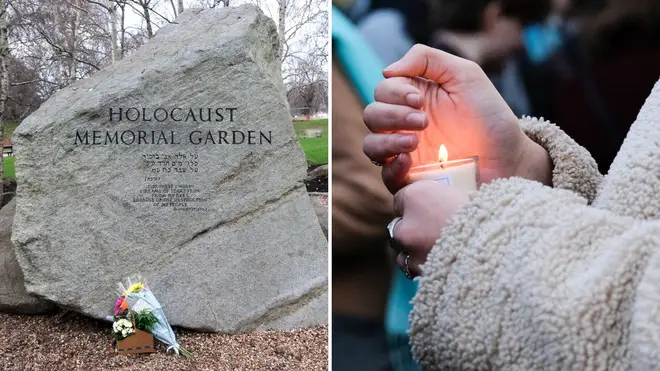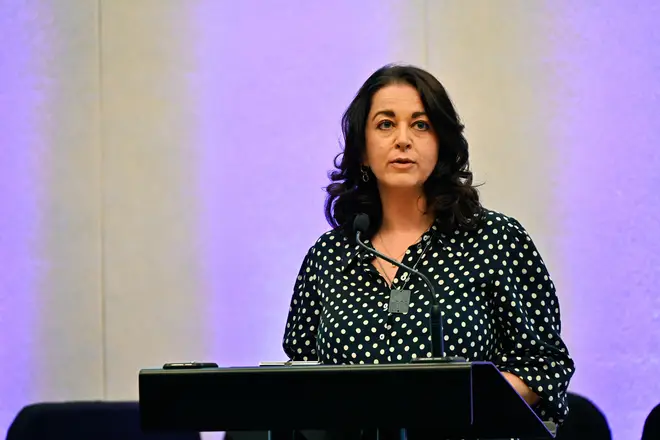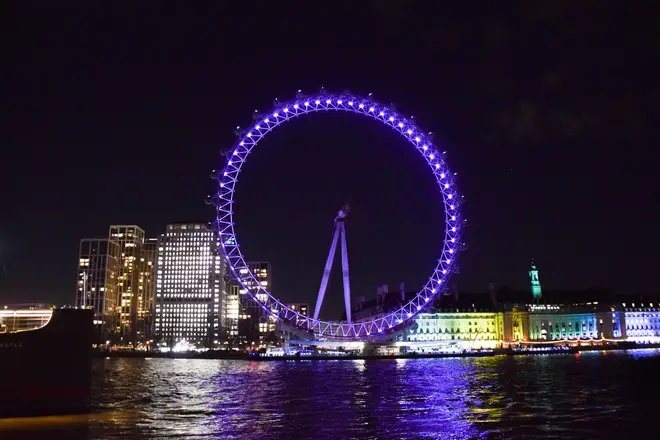
Clive Bull 1am - 4am
27 January 2024, 13:38 | Updated: 27 January 2024, 13:42

A charity chief has said the ‘huge increase in anti-Semitism’ has left the Jewish communities with ‘heavier hearts’ this Holocaust Memorial Day.
Karen Pollock, chief executive of the Holocaust Educational Trust, has said Holocaust Memorial Day is particularly poignant this year “against the backdrop of a massacre”.
Holocaust Memorial Day marks 79 years since the Auschwitz-Birkenau concentration camp was liberated.
It remembers the victims of the Holocaust, as well as more recent genocides in Cambodia, Rwanda, Bosnia and Darfur.
Ms Pollock said the rise in anti-Semitism has left her with "pain in my heart".
She said: “We've seen a huge increase in antisemitism ever since in this country, but also globally.
"It couldn't be more blatant at the moment, whether it's online but also on our streets.
"I say all of this, with pain in my heart, with concern for concern for our Jewish community, mindful that actually we all want a society where we believe in community cohesion and tolerance and getting along."
It comes as new figures show incidents of anti-Semitism referencing the Holocaust increased by 104% in the UK in 2023.
Read more: Rishi Sunak 'slams' despicable rise in anti-Semitism in UK ahead of Holocaust Memorial Day

The Community Security Trust (CST) received double the number of reports of Holocaust-related anti-Semitism last year, increasing from 469 to 955.
More than half the incidents occurred after the October 7 attack, Sky News reports.
Ms Pollock said there have been additional security concerns for this year’s commemorations due to the rise in anti-Semitic incidents.
"There are some events that are having to have more security," she said.
"It's a difficult time, but that doesn't stop us from coming together and recognising what was a seismic event in history whose repercussions are still felt today.
"I think we enter this with a slightly heavier heart."
Israel launched its massive air and ground assault on Gaza after Hamas militants stormed through Israeli communities on October 7 killing some 1,200 people, mainly civilians, and abducting another 250.
Israel's offensive in response has killed more than 26,000 Palestinians in Gaza, according to the Hamas-run health ministry in the territory.

The conflict has seen several pro-Palestine marches across the world, often from those calling for a ceasefire in Gaza.
Ms Pollock said of the protests: “I think that there are many people with good intent, who really want to see an end to the conflict and want to see peace in the region, as do I.
"That said, there are, sadly, people who are there in bad faith. There are placards being held up at protests which equate Israel with the Nazis, there are chants for an intifada, there is inflammatory language about Jews and Israel - and as a result, these protests have become a real source of concern for the Jewish community.
"But I really believe, and I think our survivors believe this, that the majority of people in this country are decent, good people who are horrified by the massacre committed by Hamas, who are horrified by what the Nazis did during the Holocaust."
The London Eye will be lit purple on Saturday to commemorate Holocaust Memorial Day while cities across the country mark the day in their own way.
Earlier this week, Prime Minister Rishi Sunak condemned the "despicable" rise in anti-Semitism in the UK in a speech on Holocaust Memorial Day.
He said: "It is sickening that Jewish people are once again facing the most abhorrent anti-Semitism in this country, in this century.
"As prime minister, my message is clear: We're not going to cower away and accept it, not on my watch."